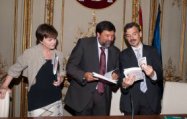
FEDERACION ESPAÑOLA DE MUNICIPIOS Y PROVINCIAS
- Contact |
- Who are we? |
- Site Map |
- Job offers
Created Observatory of Religious Pluralism
The normalization of coexistence based on respect for diversity is one of the objectives behind the creation of the Observatory of Religious Pluralism and Local Government, whose mission is to be fulfilled in each of the municipalities in Spain. This was expressed by the Secretary General of the FEMP, Isaura Leal, in the presentation of the Observatory, together with the Minister of Justice, Francisco Caamaño, and the Director of the Foundation for Pluralism and Coexistence, José Manuel López.
The Observatory of Religious Pluralism in Spain, created when the following 31 years of entry into force of the Law on Religious Freedom, offers municipalities a tool for public management of religious diversity, while the government focuses on implementation of management models tailored to the constitutional principles and legal framework governing the exercise of the Right to Religious Freedom in Spain.
It comprises representatives of government and FEMP-chaired by the Minister of Justice and Vice President of the ranks, the Federation of Autonomous Communities and a member of the Scientific Committee which brings together renowned personalities and heads of research groups in the field of religious pluralism.
The Minister of Justice, Francisco Caamaño, said the operation of this body is "a before and after" with respect to institutional treatment of religious pluralism in Spain. The initiative does not seek to "encourage" religious pluralism, but to confront the fact that co-exist in Spanish society and people of different religions as a result of migration, he said.
He also stressed that the key is to provide various public managers, especially the mayors, useful information about different religions, because with this knowledge can prevent this plurality is a "problem."
Normalize coexistence
The Secretary General of the FEMP said that the purpose of Local Government is to normalize the coexistence based on respect for diversity, and to this end the Observatory is a good management tool that will allow local officials to have more effective mechanisms for improvement in exercise of the powers related to religious diversity. We're talking, 'he explained to standardize religious freedom in education, health or the media to recognize the "officers" to the collective imagination of our society.
Isaura Leal recalled that FEMP has worked several years in collaboration with the Ministry of Justice, the transposition of legislation on religious freedom and the rights attaching to the municipal administration, and the first step was to "recognize religious communities as true agents of social life in the municipalities. " Far from conflicting religious plurality can be a factor of cohesion and true integration "if we allow its insertion in the social and cultural dynamics of the city," he said.
He also warned that "we have a long road to travel" and will need to be aware of the monitoring indicators of ongoing evaluation for changing the actions proposed initially, if need be. "Maybe we have to wait even a third generation, for more tangible results," he acknowledged.
Isaura Leal gave a word of gratitude to the former Justice Minister Mariano Fernandez Bermejo, the deputies and Alvaro Eugenio Nasarre Cuesta, and Mercedes Rico-Godoy, for his pioneering work in this field and drivers of the Observatory after five years of work is now a reality.
Tool for municipalities
The Observatory provides updated data at the municipal level on places of worship of different faiths with implantation in the Spanish State, systematize the rules that has to do with the exercise of religious freedom, develops guidelines for support and also identifies and promotes good governance practices of religious diversity.
All this is done through your web www.observatorioreligion.es which is divided into three main sections: Tools for "municipal" councils for public institutions in general and the search for general information about religions.
The highlight is the section referred to the "municipal", allowing the Spanish mayors know, for example, what denominations are in your municipality and how to contact their representatives. It also offers the first mayors and legal information on other burials of people of different religions and places of worship where to place.

